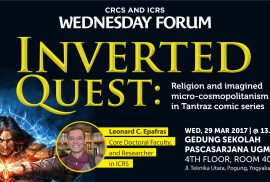
Abstract
As suggested by Ben Anderson, media is a powerful means in creating imagined community and accordingly in establishing a sense of cosmopolitanism. Taking this insight, the presentation will explore the rethoric represented in the series of comic under the title Baladeva, published by Tantraz Comiks (/Comics) Bali, Denpasar. The comic will be framed within the notion of micro-cosmopolitanism—a cosmopolitanism from below (Cronin, 2006)—through which the pressing questions of imagination of nationalism and cosmopolitanism, counter-transnational religious discourse, and religious minority are played out. Contemplating the present day contestation between nationalism and transnationalism discourse, understanding contemporary comics to a degree might illuminate the shift in the present Indonesia, notably from the perspective of popular culture.
Speaker
Leonard Chrysostomos Epafras is a core doctoral faculty and researcher at the Indonesian Consortium for Religious Studies, at the Graduate School of UGM. His research projects include Jewish Studies, Digital Humanities, and Pop-Culture Studies.
Look at the full poster here.
ICRS

Abstract
Elsewhere argued that the line divides the “real,” offline realm and cyberspace is blurred. Both realms are becoming interpenetrative and as demonstrated in many cases such as the Arab Springs, the United States and Indonesian Presidential elections, the composite power of the two may determine the socio-political direction of a region. Following this observation and considering the dramatic expansion of Indonesian cyberspace, in term of internet penetration, mobile subscription, and social media fluency, it is timely to look closer to it as an emerging religious public sphere. The present presentation focused on the younger generation religious expression. Younger generation, the “Millennials” generation (18-34 years old) as some researches framed it, is considered among the main steams behind this space, among others as the arena of their quest for individuality, and to a degree for the enhancement of their piety. Indonesian cyberspace is complicated with the audacity of religious expression and the tangled governance by the state in the post-New Order, hence understanding younger generation perception on religion might reveal the shifts that are happening in the Indonesian society. The preliminary assessment of the issue displayed a nuanced and complex presentation of religiosity of this generation, beyond the argument of superficiality, put forward by some other observations. It is furthermore showed an intersection issue of religious authority, imagery of pluralistic society, and transnational religious phenomena.
Speaker
Leonard C. Epafras is a core doctoral faculty in the Indonesian Consortium for Religious Studies, UGM Graduate School, Yogyakarta. He won the Endeavour Scholarship Fellowship 2015 to conduct his post-doctoral research as well as presented the ongoing research project initiated by the ICRS, the Indonesian Interfaith Weather Station (IIWS). His research interests are including history of religions, inter-religious interaction, and digital humanities/humanities computing.



